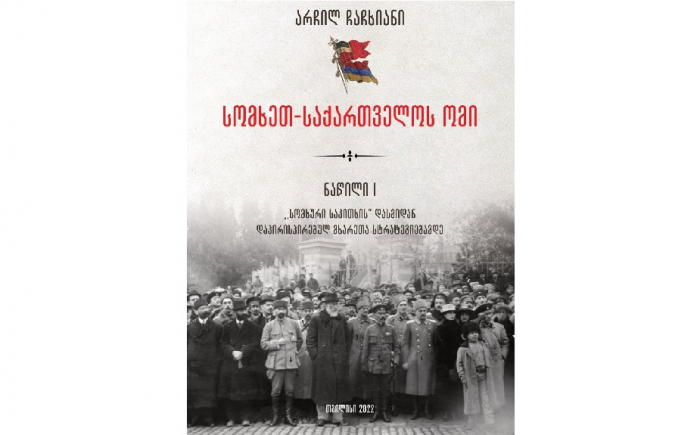22.10.23 17:30

Part 6.
The remarkable beginning of the growth of Armenian revolutionary activity coincides with the period of the Transcaucasian Seimas, namely 1918, when the Bolshevik Stepan Shaumian tried in vain to seize the reins of power through a mass provocative speech delivered in Tbilisi's "Alexander's Garden". By decision of the Transcaucasian Seimas, a detachment of Red Guards thwarted this Bolshevik idea by force of arms.
After the failure of this provocation, Shaumian was forced to go into hiding, to leave the city by conspiracy and to move to Baku. In "Essays on the History of Georgia" we read about Stepan Shaumian:
"On 16 December 1917, at the meeting of the Council of People's Commissars of the RSFSR, chaired by Lenin, the question of the situation in the Caucasus was discussed. The report of the Commissar for Nationalities of Russia was prepared by I.V. Stalin. The Council of People's Commissars, taking into account the seriousness of the situation in the Caucasus and the fact that Transcaucasia was undergoing a period of decisive struggle between counterrevolutionary and revolutionary forces, adopted a resolution on the appointment of S.G. Shaumian as special commissar for the Caucasus. Despite financial difficulties, 500,000 roubles were allocated to Transcaucasia to organise the struggle against counterrevolution and transferred to the Special Commissar for the Caucasus. On 22 January 1918, Stepan Shaumian began his duties as Special Commissioner for the Caucasus.
The beginning of the bloody "character" of the Dashnaks in Transcaucasia is connected with the period of the 1905-1907 revolution, when the so-called Dashnak "fighting squads", after massacring civilians in the Ottoman Empire, tried their hand in Transcaucasia. According to Dashnak ideology, here, as in the Ottoman Empire, it was necessary to "liberate" the lands from the Tatar population for the future "Great Armenia".
The German scholar Jörg Baberowski, a professor at the Humboldt Universities of Leipzig and Berlin, writes on the basis of Russian archival material: "As early as November 1905, one of the delegates to the Dashnaktsutyun district conference in Baku expressed his own vision of the future very clearly and openly. He claimed that peaceful coexistence with Muslims would only be possible if they felt their weakness and knew that there was a power capable of defeating them, or at least punishing them. On this basis, he recommended the expulsion of all "Tatars" from the areas of mixed Tatar-Armenian population.
Soon this ideology was also spread by the Dashnaks. These facts are confirmed by many authors and historical materials. To list them would take us too far, but we will quote just one memoir by an eyewitness of the events in Baku. The author of this memoir is an Armenian by nationality, Arutyunyan. Here is what he writes:
"At the beginning of 1905, the fratricidal war in Baku continued in the Kamarli district, where armed Mauser bandits were fighting. They carried out the destruction of the Azerbaijani population under the slogan: 'Kill as many as possible indiscriminately, rob everyone ruthlessly'. They roamed the Armenian villages, making speeches, calling on the labouring peasantry to "protect the dignity and lives of the Armenians" with weapons in their hands, thus trying to turn the Armenian population against the Azerbaijanis. Desperate bandits robbed and killed civilians, burned their villages. And after this news, these so-called "saviours" of the Armenian people returned to their homes and held parties to celebrate their "victories".
The fact is that during the 1905-1907 revolution, the "Dashnaktsutyun" party fought against both tsarism and non-Armenian peoples, especially the Muslim population.
From Archil Chakhiyani's book "The Armenian-Georgian War".
To be continued
Read: 226
Write comment
(In their comments, readers should avoid expressing religious, racial and national discrimination, not use offensive and derogatory expressions, as well as appeals that are contrary to the law)
News feed
-
The struggle of two empires for Georgia - the heat of events is only accelerating
20:4904.05.24
-
Georgian Parliament holds yellow security level
12:0903.05.24
-
18:0002.05.24
-
Georgian Parliament Speaker, EU official review cooperation, integration
17:3202.05.24
-
US State Department condemns foreign influence bill advanced in Georgian Parliament
16:4002.05.24
-
Georgian Economy, Finance Minister review cooperation, projects with World Bank Executive Director
16:0002.05.24
-
15:0502.05.24
-
14:2902.05.24
-
13:5202.05.24
-
Austrian Airlines launches Vienna-Tbilisi flights
13:0002.05.24
-
12:1002.05.24
-
Health Ministry: Eight hospitalized during protest, patients' health conditions are satisfactory
11:2202.05.24
-
Ursula von der Leyen: Georgian people want European future for their country
10:1602.05.24
-
Is Echmiadzin opposed to peace in the South Caucasus? Once again...
18:5701.05.24
-
Georgian Parliament official highlights “threats” of external interference among “European public”
18:0001.05.24
-
17:0801.05.24
-
16:2701.05.24
-
15:2701.05.24
-
Josep Borrell Responds To The Situation In Georgia
14:4301.05.24
-
Tbilisi Mayor says Europe needs worthy, strong states
14:0001.05.24
-
Georgia imported 265 tons of lentils in January-March
13:3101.05.24
-
12:5001.05.24
-
12:0501.05.24
-
11:3101.05.24
-
10:5001.05.24
-
Yellow level of security regime to be again in effect in Parliament today
10:1601.05.24
-
Armenians in the Ottoman Empire: What Was, What Could Have Been and Today's Reality
7:5501.05.24
-
18:0530.04.24
-
Vice-President of the European Commission: I advised Ilia Darchiashvili to review our directive
17:1030.04.24
-
The Parliament elected Giorgi Kalandarishvili to the post of CEC Chairman
16:1530.04.24
-
15:4030.04.24
-
According to the government's decree, May 7, 8, and 10 were declared public holidays
13:5930.04.24
-
13:2130.04.24
-
Geostat: Georgia's economy grew by 8.2% in March
12:5030.04.24
-
President: Today, some people want to portray our 30-year-old allies and partners
12:0530.04.24
-
Georgian PM says “no alternative” to opening EU accession talks with country this year
11:3230.04.24


